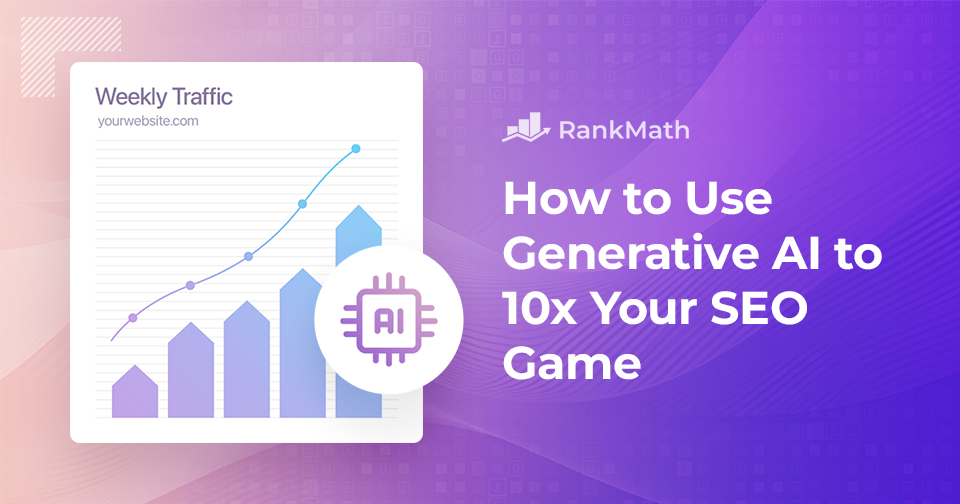Have you ever wondered what’s cooking behind the scenes when you type a search query into Google and magically get a list of relevant websites? Or how some websites manage to sneak to the very top of that list?🧐
Well, get ready to embark on a journey that uncovers the magic portion behind these wonders – Generative AI for SEO!
Whether you’re an entrepreneur seeking to improve your brand’s recognition or a content creator aiming to reach a wider audience, the collaboration of Generative AI and SEO promises to catalyze your success.
From uncovering untapped keywords to crafting captivating content and beyond, Generative AI is here to amplify your efforts and elevate your online presence to unprecedented heights.

Throughout this blog post, we’ll dive deep into the core of this synergy, exploring how Generative AI can transform your SEO strategy from good to extraordinary.
Table Of Contents
1 Understanding Generative AI in Layman’s Terms
Now, hold on a second – before we zoom into the incredible fusion of Generative AI and its power-packed potential to revolutionize the world of SEO, let’s first quickly understand what Generative AI is.
So, let’s break it down! 🤖
Have you ever daydreamed about having a computer buddy who can create new ideas, create art, or even write stories, just like a super-creative friend? That’s what Generative AI is all about – it’s like having a virtual artist or writer hanging out on your computer!
Now, you might wonder, “Hold on, what’s AI again?” Great question!
AI stands for Artificial Intelligence, which makes machines do smart things. It’s like teaching your pet robot to do cool tricks.
But wait, there’s more!
Generative AI takes things up a notch.
It’s like asking your computer, “Hey, can you make me a new song that sounds like a mix of my favorite tunes?” And guess what? The AI gets to work and whips up a catchy melody that feels like it was made just for you. 🎶
Here’s an example of a Generative AI-integrated Search interface:
Generative AI can significantly enhance AI SEO (Search Engine Optimization) efforts by assisting in content creation, keyword research, and content optimization.
It helps in content creation by generating high-quality, SEO-friendly content at scale. Generative AI assists in keyword research by analyzing vast amounts of textual data to identify relevant keywords and emerging trends
Also, by suggesting keyword integration and Schema Markup, generative AI enhances the SEO performance of product pages for e-commerce websites.
2 Leveraging Generative AI for SEO Success
Now, you might be thinking about whether you can use AI for SEO.
The answer is Yes; you can use AI for SEO.
Embracing Generative AI for SEO is a game-changer, allowing businesses to stay ahead of the competition and achieve online success.
But one question continues to pop up here is:
Do search engines penalize AI-assisted content?
No, search engines do not penalize AI content.
According to Statista, 42% of marketers trust AI to create personalized content.
Search engines like Google reward high-quality, helpful content, no matter how the content is produced.
When used correctly, AI can help you achieve just that. Google has directly addressed this issue and released guidelines on properly using AI-generated content to meet Google’s E-E-A-T standards.
One big challenge using traditional SEO methods is digging up the right keywords.
Think about it – how do you figure out what words people are typing into search engines to find content related to your website? It’s like being a mind reader, right?
With Generative AI, content creation becomes a breeze as it can generate high-quality, SEO-friendly content that resonates with both search engines and users. This technology enables marketers to efficiently create engaging meta tags, headlines, and descriptions that boost click-through rates.
Moreover, Generative AI can analyze search trends and user behavior to provide valuable insights for keyword research and content optimization.
Gartner predicts that by 2025, Generative AI will account for 10% of all data produced, up from less than 1% currently.
3 The Ethics of AI SEO: Balancing Innovation and Authenticity
When integrating AI into search engine optimization, finding a middle ground between embracing innovation and staying true to your authentic voice is essential.
We all know that feeling when encountering content that doesn’t sound right. It’s one of the concerns with AI-generated content.
While AI can speed up processes and create content rapidly, it’s important to remember the value of maintaining a human touch. Building trust with your audience relies on authenticity and transparency.
While AI SEO can generate content in a flash, it’s essential to establish some guidelines. Think of it like training a puppy – you teach it what to do and what not to do. Instruct your AI companion to adhere to your brand’s values and style when writing. This ensures your website’s content stays on track and doesn’t become a robotic tangent.
4 Implementing AI SEO: Best Practices
Using AI technology to analyze extensive datasets for keyword research, pinpoint content gaps, or monitor user behavior on your website can help you make informed decisions.
We’ll now discuss the various ways to implement AI SEO to help you improve your SEO game further.
4.1 Site Structure Planning
Generative AI uses artificial intelligence algorithms to analyze data and user behavior, ultimately providing insights and suggestions for organizing website content in a search engine-friendly manner.
For instance, by examining existing content, AI can identify key topics and propose categories that enhance user experience. Consider a technology-focused website where AI recognizes topics like “Software,” “Hardware,” and “Tech News,” and recommends a site structure that neatly organizes content under these headings.
Additionally, by analyzing user behavior, AI can suggest a structure that prioritizes sections with higher engagement, leading to a more intuitive navigation flow.
Using 10Web.io, the AI Website Builder, you can create a fully functional website within minutes.
4.2 Generative AI for Keyword Research
Traditional keyword research is a time-consuming task, limited by the availability of data sources and human creativity. You brainstorm, guess, and look at what your competitors are doing. But you’re not always sure if your guesses will hit the bullseye.
With AI-powered tools, there’s no more guessing! Unlike generic keyword lists, AI-powered tools analyze your specific domain and provide relevant keywords that align with your niche, enabling you to establish topical authority more effectively.
It’s important to note that while free AI-based tools like ChatGPT can offer keyword suggestions, they may not consider essential content success metrics such as keyword difficulty, search volume, and domain relevance.
Here’s a keyword research example from ChatGPT.
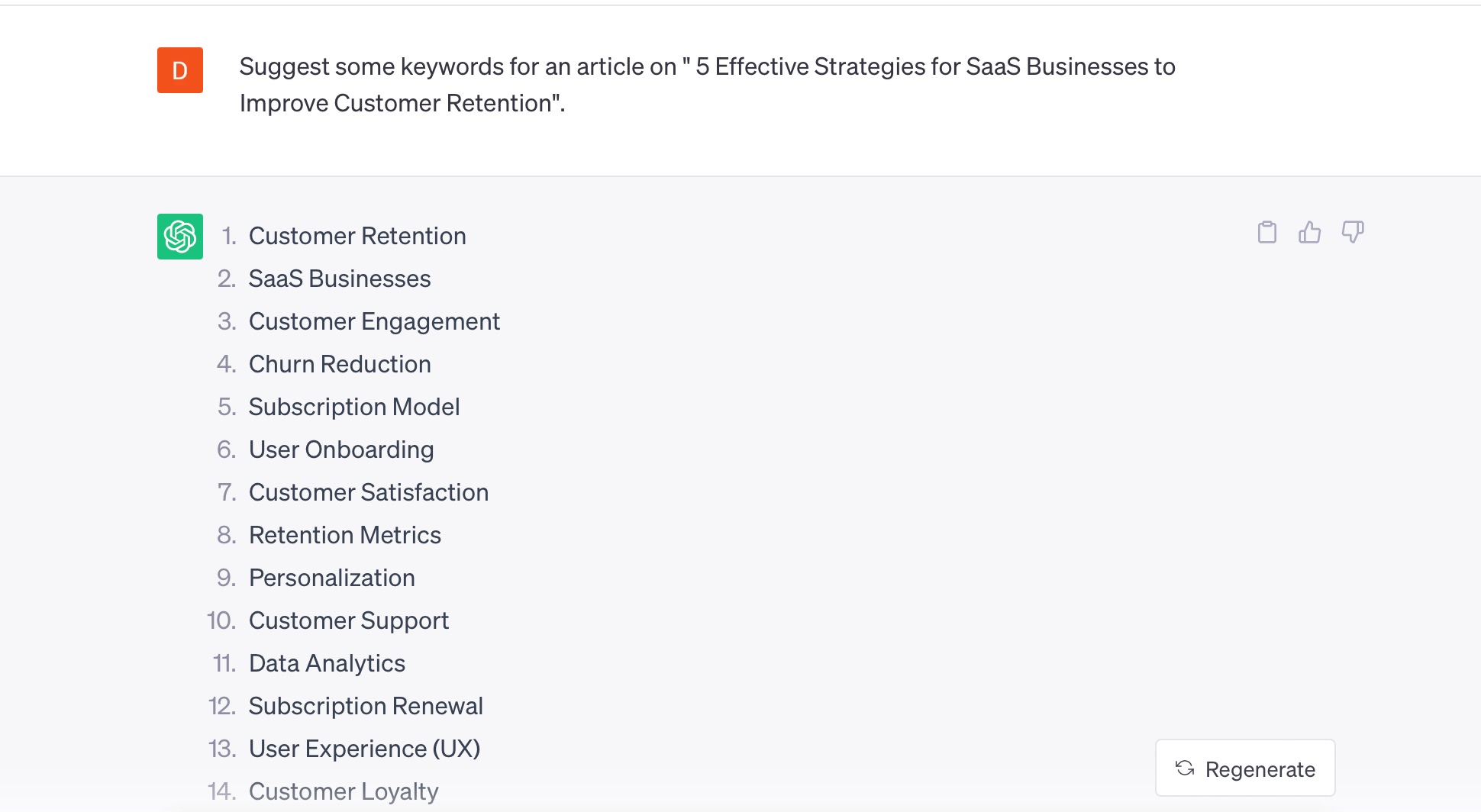
To overcome this limitation, it’s recommended to use a dedicated keyword research tool like the Semrush Keyword Research tool, Google Keyword Planner, Ahrefs Keyword Generator, etc.
Although Rank Math isn’t really a dedicated keyword research tool, Rank Math’s Content AI suggests the potential or important keywords that you can add to your content.

4.3 Create Compelling Content: AI as Your Creative Partner
Imagine you’re a painter with a blank canvas and a vision in your mind. But sometimes, the right words don’t flow as easily as paint from a brush. This is where AI steps in!
Artificial intelligence (AI) may, for instance, write blog posts, image captions, emails, social media text, and product descriptions. And the best part of AI is that it saves time and sparks creativity.
Rank Math’s innovative Content AI tool helps you unlock new levels of productivity and unleash your creativity. Our friendly AI technology will assist you in crafting compelling content that captivates your audience.
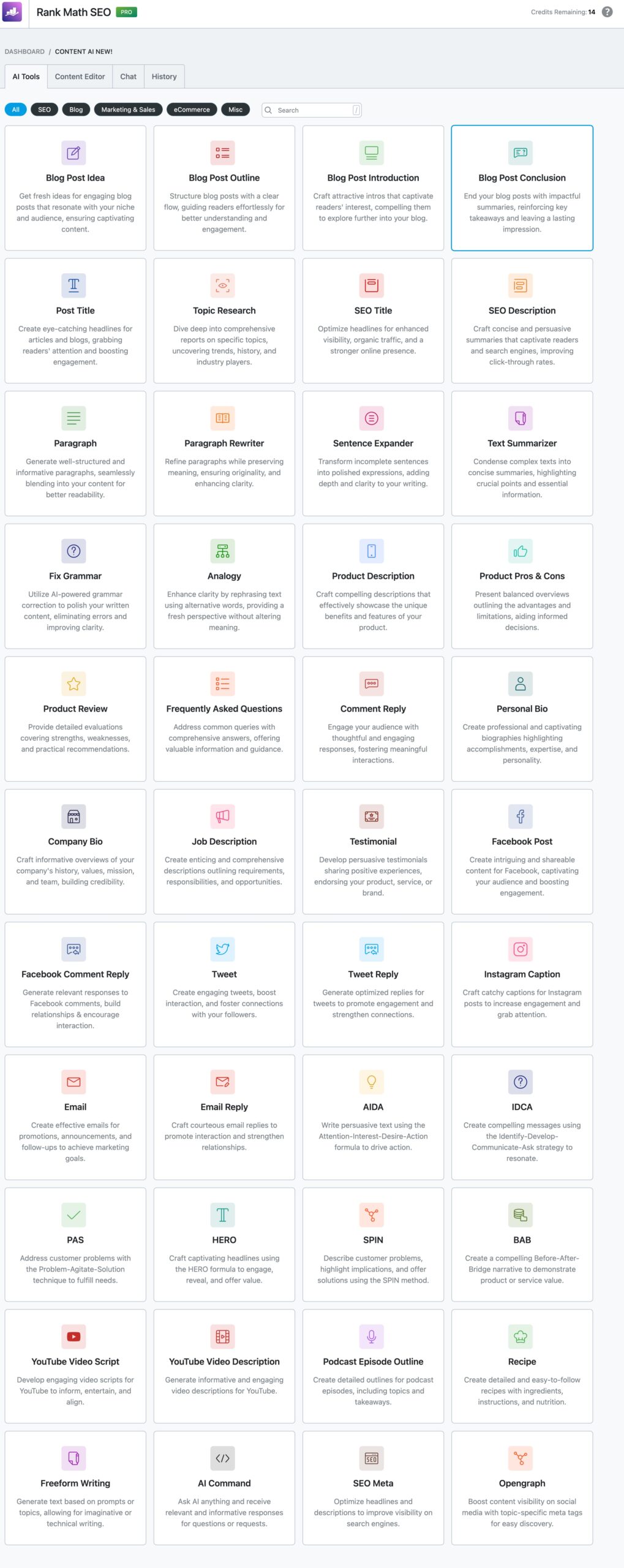
Join us today and experience the future of content creation.
Now, let’s take a quick look at the content creation process using AI.

While AI can accelerate content production, human review remains essential for ensuring quality and accuracy.
AI lacks the understanding and contextual insight humans bring to content creation. Moreover, algorithms may overlook errors that humans can catch. Additionally, plagiarism checks must always be performed to maintain originality and credibility.
Conceptualization and Articulating the Creative Vision
Begin by outlining your content idea.
Whether it’s an article about sustainable living or a product description for your new gadget, provide a clear direction for your AI tool. For instance, you can prompt, “Generate an article discussing the benefits of sustainable living.”
It’s extremely simple to generate an outline for your content using Rank Math’s Blog Post Outline tool, as shown below.
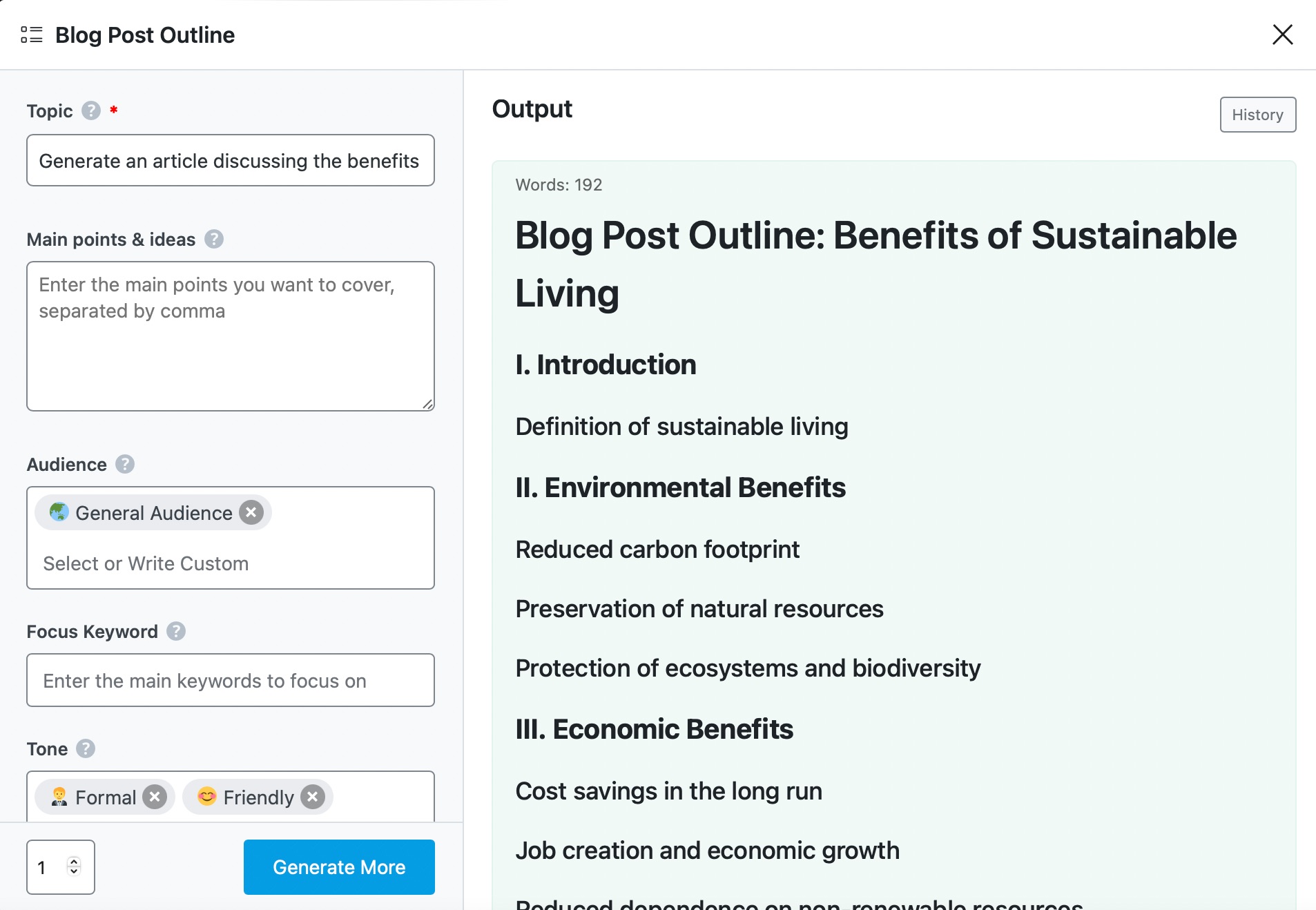
AI-Powered Generation
AI SEO takes your prompt and uses its powers to create engaging content. Specify the style and tone you desire for your content – formal, informative, conversational, etc. This interactive collaboration will then transform your ideas into well-structured content.
You can use our AI tools like Blog Post Introduction, Blog Post Conclusion, Paragraph, and Paragraph Rewriter to create stunning content.
Refinement and Personalization
AI provides a base, but you need to add the seasoning. Review the AI-generated content and infuse it with your unique insights and expertise. You can add relevant examples, statistics, etc., that resonate with your target audience. This ensures the content aligns seamlessly with your brand’s voice and values.
4.4 Grammar and Spell-Checking
The AI-driven tools go beyond traditional spell checkers by understanding context, syntax, and grammar rules to provide more accurate and contextually appropriate corrections.
For instance, an AI grammar checker can identify and rectify complex grammatical errors in sentences, ensuring that the content not only adheres to proper grammar but also maintains clarity.
Consider a scenario where a user writes, “Their is a mistake in this sentence.” A generative AI grammar checker will not only catch the spelling error (“Their” instead of “There”) but also suggest the grammatically correct version: “There is a mistake in this sentence.”

Moreover, these tools can offer suggestions for sentence structure, word choice, and writing style, contributing to overall content improvement.
Tools like Grammarly correct grammatical mistakes with ease.
4.5 Mastering On-Page SEO With AI Assistance
AI-driven tools can examine your content and offer valuable information about on-page SEO factors such as keyword implementation, readability, product titles, descriptions, and post meta titles and descriptions.
Consider an example of generating SEO title ideas using Rank Math’s Content AI. Enter your post title, and our AI SEO Title tool will generate SEO titles within a flash.
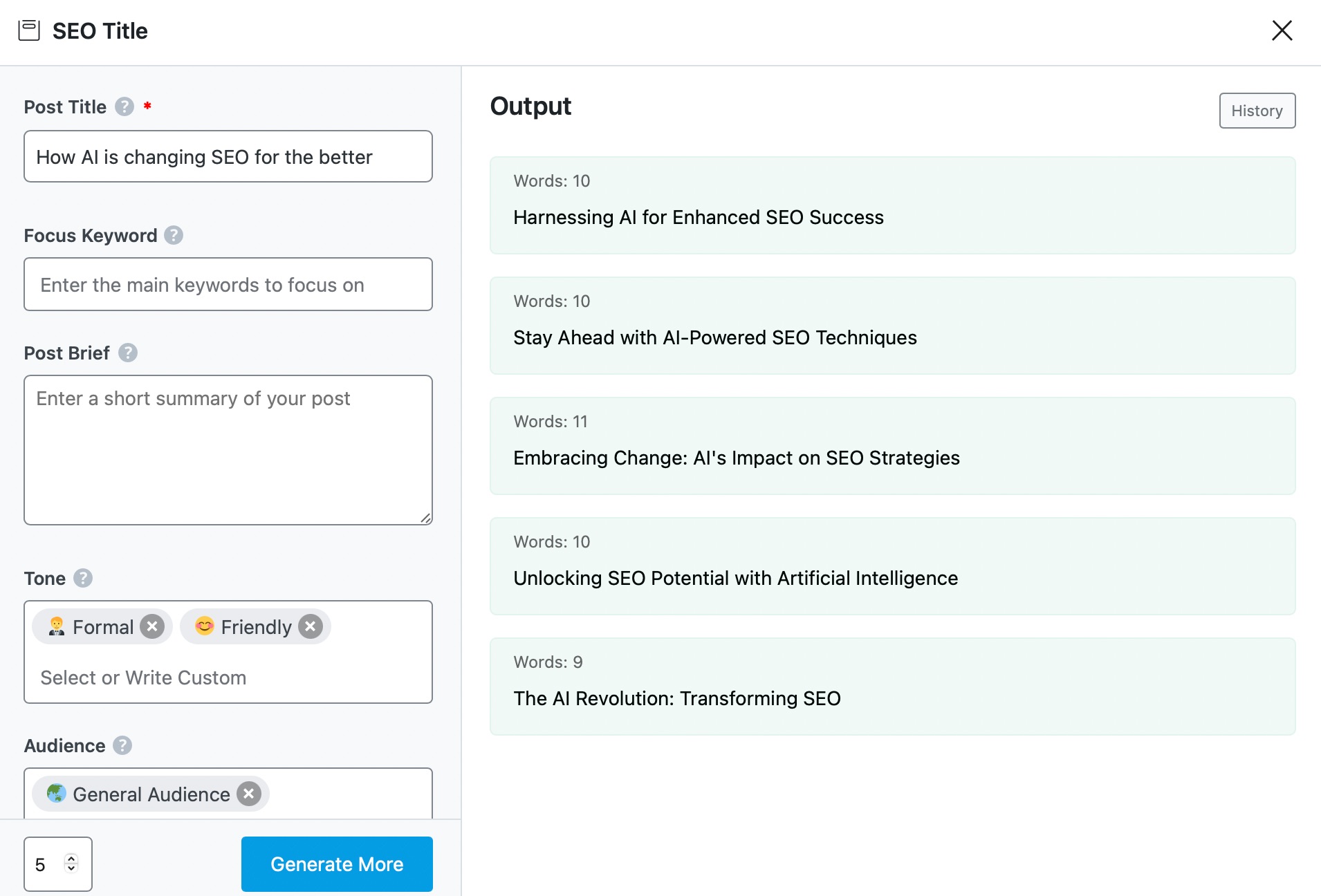
Similarly, you can use SEO Description and Product Description tools to enhance your on-page SEO strategy.
By integrating AI into your on-page SEO strategy, you can ensure that your on-page SEO elements are strategically placed, increasing organic visibility on search engine results pages.
4.6 Revolutionizing Content Outreach
Now, let’s dive into the next segment of revolutionizing content outreach – it’s like boosting your website’s popularity! 🚀✉️
Understanding Backlinks and Content Outreach
Let us now discuss how AI helps to find backlinks and perform content outreach.
AI’s Linking Magic
Now, picture having an AI tool that knows who to invite to your party. AI is like a savvy party planner, analyzing websites in your niche and finding potential linking opportunities.
For example, if you run a cooking blog, AI might suggest contacting food bloggers, recipe sites, or culinary magazines for backlinks.

Personalized Outreach Emails
Have you ever received a party invite that felt like it was meant just for you? That’s the magic of personalization!
AI can craft outreach emails that feel human-made. Imagine you’re reaching out to a travel blogger for a backlink.
Rath Math’s Email tool can help you write an email, as shown below.
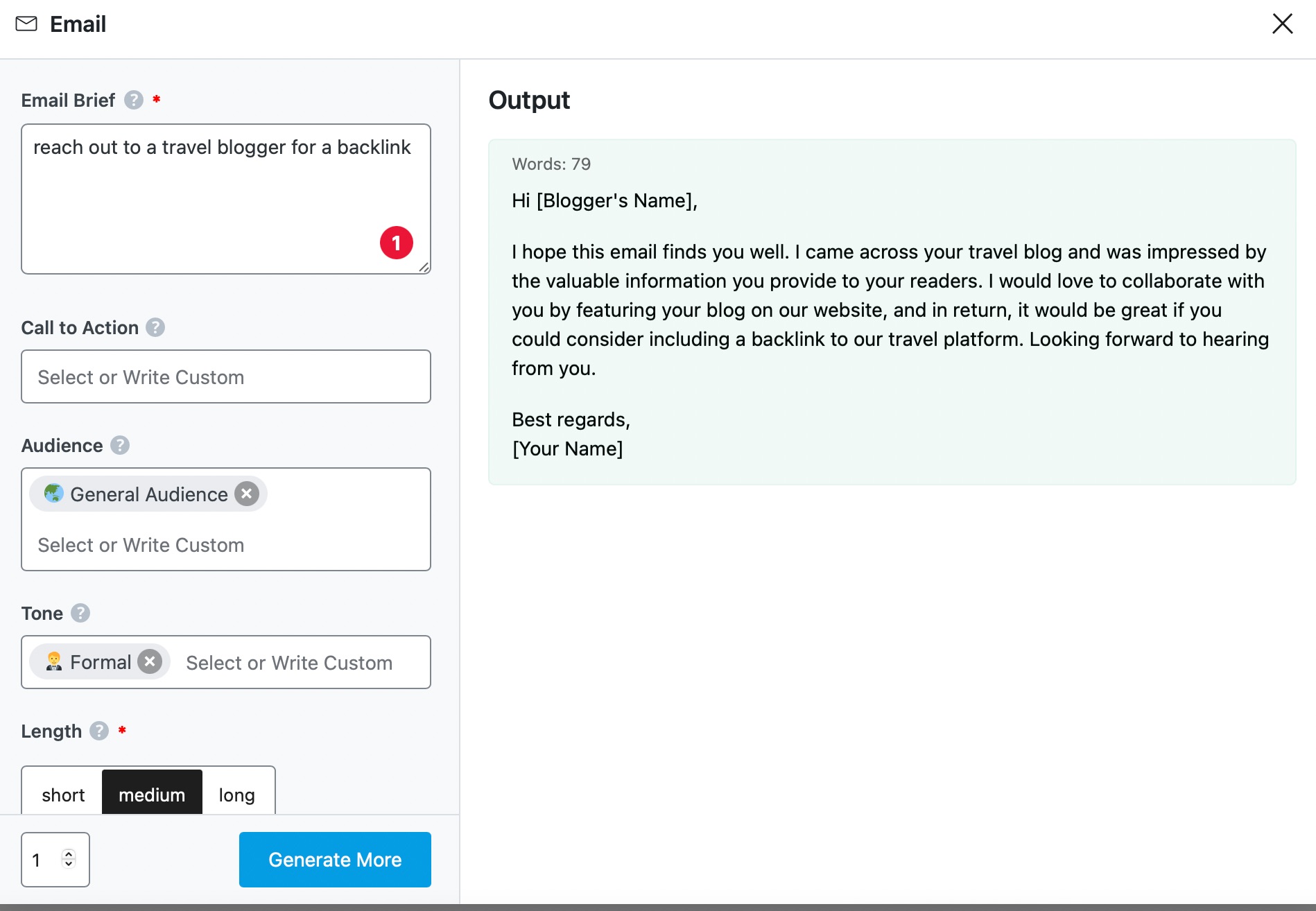
With AI, content outreach becomes like having a marketing guru in your corner. So, revolutionize your content outreach with AI, and watch your website’s guest list grow in no time! 💌
4.7 Improve User Experience With AI
Do you know that around 62% of consumers prefer chatbots for communication with brands? That’s like saying most users appreciate AI’s speedy responses!
Let’s explore how AI steps up to improve the customer experience.
Swift and Smart Responses
AI-powered chatbots instantly reply with answers that fit your questions perfectly. They understand what you’re asking and provide you with quick solutions. It’s like having a 24/7 helper at your service.
Our Content AI module includes a built-in chat assistant called RankBot to enhance your marketing, research, and content creation process.
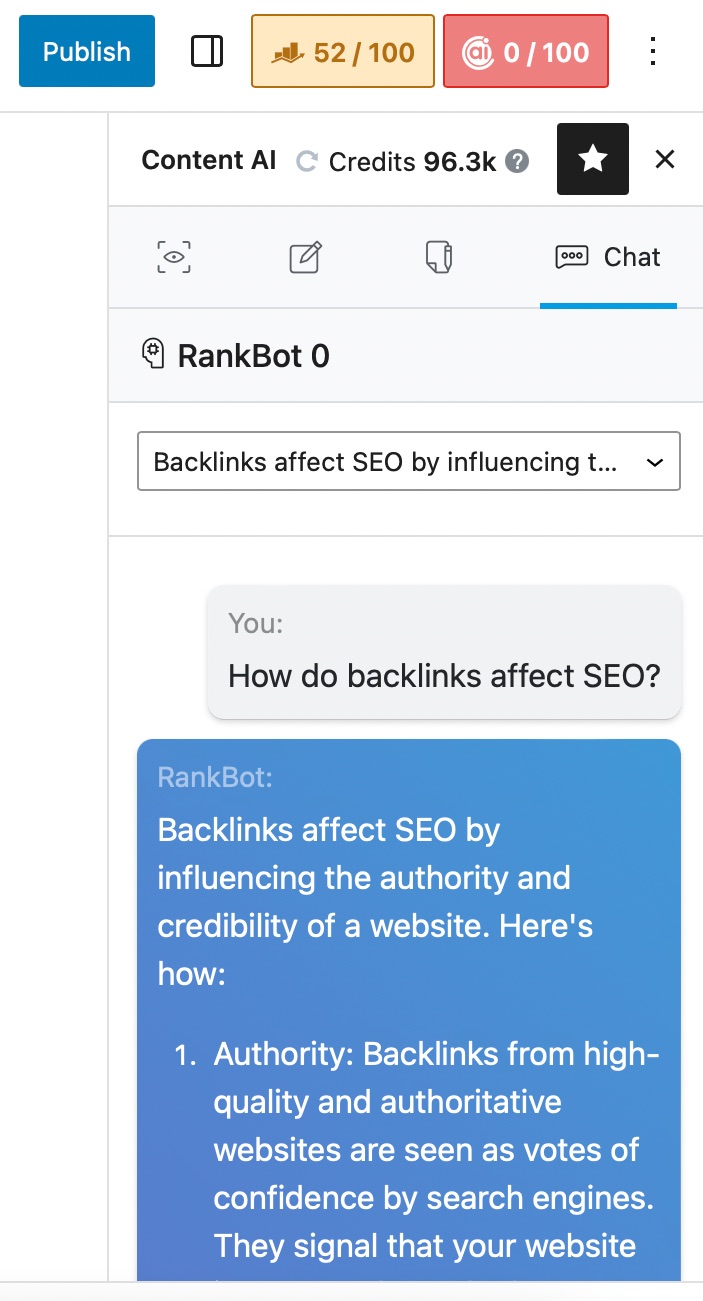
Personalized Recommendations
Remember when you wanted a new gadget, and AI suggested the exact one? It’s like having a shopping expert who is aware of your choices. AI remembers what you like and suggests products that match your taste. AI analyzes your choices to make spot-on predictions.
With AI on your side, your customer experience gets an upgrade, making your journey smoother, more personalized, and super convenient.
4.8 AI-Powered SEO Analytics and Reporting
Traditional SEO analytics frequently face the challenge of handling extensive datasets. Decoding trends, understanding user behavior, and evaluating campaign success may seem like a complicated puzzle. Moreover, the time-intensive process of manual analysis becomes difficult and slows down the process.
If your team finds it challenging to keep up with traffic analytics reporting, AI’s proficiency in data analysis, pattern recognition, and automation offers a practical solution to uncover trends efficiently.
This allows your team to allocate more time to strategize on leveraging these insights to enhance your SEO, rather than getting bogged down in manual data generation processes.
Explore accessible and cost-effective solutions with Google Sheets and ChatGPT for seamless ongoing data analysis and tracking.
You can streamline your workflow by automating data exports from Google Analytics, Google Search Console, MySQL, or various SEO platforms directly into Google Sheets.
You can also enhance your analytical capabilities by connecting to your OpenAI API using GPT for Sheets or a similar add-on. You can then easily analyze data directly within Sheets, simplifying your processes.
5 Glimpsing Into the Future: AI’s Potential in SEO
AI and SEO are dynamic duos that have already joined forces to transform how websites rank and engage online.
As time goes on, we can only expect even more advanced AI-driven techniques to boost SEO. AI might better understand user intent, predict trends, and create personalized experiences.
AI might also unravel the mysteries of voice search even more, ensuring websites are perfectly optimized for spoken queries.
Just like you binge-watch your favorite show to catch every twist, staying up-to-date with AI trends is important. The world evolves quickly, and AI’s impact on SEO is no exception.
Whether through blogs, webinars, or AI-related courses, keeping yourself informed will be the best strategy to maximize AI’s potential.
6 Conclusion: A New Era of SEO Empowerment
In this new era of SEO empowerment, AI is a game-changer that will take your strategies to new heights. AI empowers you to create engaging content tailored to your audience’s desires.
With AI by your side, you’re not merely optimizing for search engines; you’re optimizing for your audience, who seek what you offer.
So embrace the AI-powered future, where innovation meets authenticity, and your SEO game is not just 10X stronger – it’s a symphony of progress that resonates with technology and the human touch.
If you like this post, let us know by Tweeting @rankmathseo.
